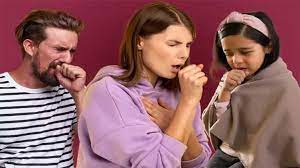Monitoring Desk
NEW YORK: It is the time of year when everyone around us seems to have a cough.
It can be dry and tickly or so full-bodied that you bark like a seal.
Most coughs are due to minor irritants and quickly clear up and a recent study found the average length is 18 days.
But if yours persists it could be a sign of something more serious.
GP Dr Rachel Ward said anyone with a cough that lasts more than three weeks should see their doctor.
She told Sun on Sunday Health: “Coughs at this time of year are very common and most people do not need to consult a health professional about it.
“But if your cough is not settling by three weeks or if you notice other symptoms such as chest pain, weight loss, coughing up blood, shortness of breath, feeling very unwell or not being able to stop coughing, you need to seek advice.”
Here, Dr Ward helps to identify what might be causing your cough.
COLDS AND FLU
Symptoms: Sore throat, headaches, muscle aches, cough, sneezing, raised temperature.
Cause: A virus which causes inflammation of the membranes that line the nose and throat.
It’s often spread through airborne droplets that are coughed and sneezed into the air by a sick person, and is easily spread.
Flu is also caused by a virus, though symptoms can be more severe.
Treatment: Rest and sleep, drink plenty of water. Ease aches and pains or lower your temperature with paracetamol and ibuprofen.
Numbing sprays can ease a sore throat. Antibiotics do not work.
CHEST INFECTION
Symptoms: Usually a chesty cough with lots of yellow or green mucus, wheezing, shortness of breath, chest pain, a high temperature, aching muscles, fatigue and headaches. Symptoms can last up to ten days.
Cause: Either a virus or by a bacteria causing infection of the airway such as bronchitis.
A viral infection should clear up by itself, while a bacterial infection will need anitbiotics.
Treatment: Stay hydrated and raise your head up while sleeping to make breathing easier.
Use paracetamol to reduce your temperature and walk around regularly to fully expand your lungs.
A GP will prescribe a course of antibiotics if they suspect a bacterial infection but these don’t work for viral ones.
PNEUMONIA
Symptoms: A wet cough, sometimes with green or yellow mucus, shortness of breath, high temperature, chest pain, aches and pains, feeling very tired, loss of appetite and wheezing noises when breathing.
Confusion is common in older people and babies may make grunting noises.
Cause: Usually a bacterial or viral infection. You may catch it from someone who has it, or can get it if you have another infection such as flu or Covid.
Treatment: Fluids and antibiotics.
You are at risk of serious illness and may need to go to hospital if you are aged over 65, you have cardiovascular disease or a lung condition, or if your baby or child has pneumonia. In severe cases, doctors will give oxygen to help you breathe.
ALLERGY
Symptoms: An irritating, dry or tickly cough.
You may feel mucus dripping down the throat, or like there is a lump in the throat that you try to ease by coughing.
Cause: Viruses, allergies or hay fever can make mucus thick and sticky, which can obstruct the airways and cause a cough.
Treatment: Try a steroid nasal spray to reduce the inflammation.
LUNG CANCER
Symptoms: Constant coughing, coughing up blood, shortness of breath.
You may also experience shoulder pain, loss of appetite, weight loss, fatigue and repeated chest infections.
Cause: Lung cancer is the UK’s biggest cancer killer, leading to 34,800 deaths a year.
The biggest cause is smoking, but 14 per cent with it have never smoked.
Treatment: Early diagnosis is key so if you have any concerning symptoms see your GP.
Treatment may involve surgery, chemotherapy or radiotherapy.







